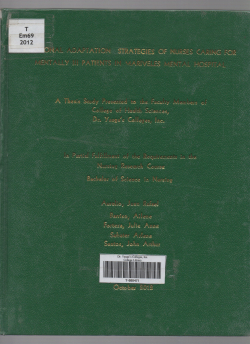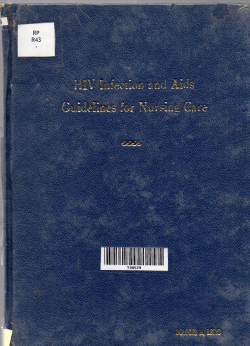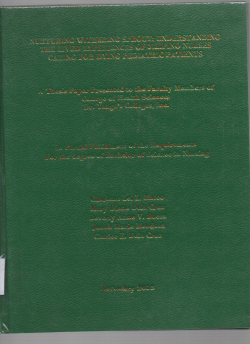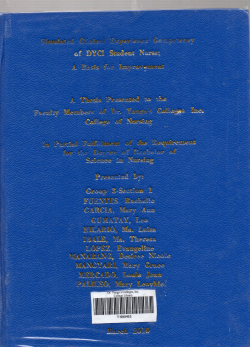Emotional Adaptation Strategies of Nurses Caring for Mentally Ill Patients in Mariveles Mental Hospital

Type
Thesis
Authors
Category
CHS
[ Browse Items ]
Subject
adaptation
Abstract
Mental illnesses are medical conditions that disrupt a thinking, feeling, mood, ability to relate to others and daily functioning. Relevantly, nurses assume a number of roles when providing care to a client depending primarily on the needs of the client and aspects of a particular environment. It is well established that caring for clients with mental illness is perceived as asituation that is personally and professionally demanding. In this regard, the researchers were particularly engrossed with the necessities of such patients. The purpose of this study was to determine which emotional adaptation strategies were more favoured by the nurses who are caring for patients with mental illness as well as to identif’ relationships between the respondents’ preferred emotional adaptation strategies and their profile. Descriptive correlational design was used. Thirty registered nurses with at least 1 year of experience in earing for mentally ill clients in Mariveles Mental Hospital were selected purposively. Respondents were assessed using Ways of Coping questionnaire made by Lazarus and Folkman which is composed of 8 strategies: distancing, self controlling, seeking social support, accepting responsibility, escape avoidance, positive reappraisal, planful problem solving and confrontive coping with a Cronbach Alpha Coefficient of 0.70 interpreted as reliable. The results revealed that in emotion focused coping category the most utilized strategy were positive reappraisal with a mean of 4.2, both seeking social support and accepting responsibility had a mean of 3.9 and 3.6 for self-controlling and distancing. In problem- focused coping category, planful problem solving was most used with a mean of 4.2. Among these, the least strategies used were confrontive coping with a mean of 3 and escape avoidance with 3.1. By means of contingency table, relationship of respondents’ civil status and gnder with their emotional adaptation strategies were verified. Results indicated that female nurses commonly use emotion- focused strategies, whereas male nurses use problem — focused. This study also revealed that single nurses often use emotion — focused coping, while married nurses use problem —focused. The research hypothesis was tested at 0.05 level of significance. Results showed a weak, positive correlation (r0.20) between the age and the emotional adaptation strategies Moreoer, a positive correlation (r0 24) was revealed between the years of experience and the emotional adaptation strategies, with an adjusted r of 0.06. It therefore implies that years of experience is only 6% predictor in choosing their preferred strategy. In determining the significance of the obtained relationship in the selection of strategies, critical value oft is 2.048,the null hypothesis was then accepted (computed tl .08<2.048, t=1 .25<2.048). This presents a significant relationship among the variables. The researchers also found out that emotional adaptation strategies were not greatly affected by the mentioned variables and there are other factors that may contribute to the preferred emotional adaptation strategy used by nurses. Results of this study suggest modification of the variables used.Particularly, the
researchers recommend specifying the classification of mental illness so that results will
not remain obscure. Additional ramifications of these findings and recommendations for
future research were discussed.
researchers recommend specifying the classification of mental illness so that results will
not remain obscure. Additional ramifications of these findings and recommendations for
future research were discussed.
Number of Copies
1
| Library | Accession No | Call No | Copy No | Edition | Location | Availability |
|---|---|---|---|---|---|---|
| Main | 471 | T Em69 2012 | 1 | Yes |



